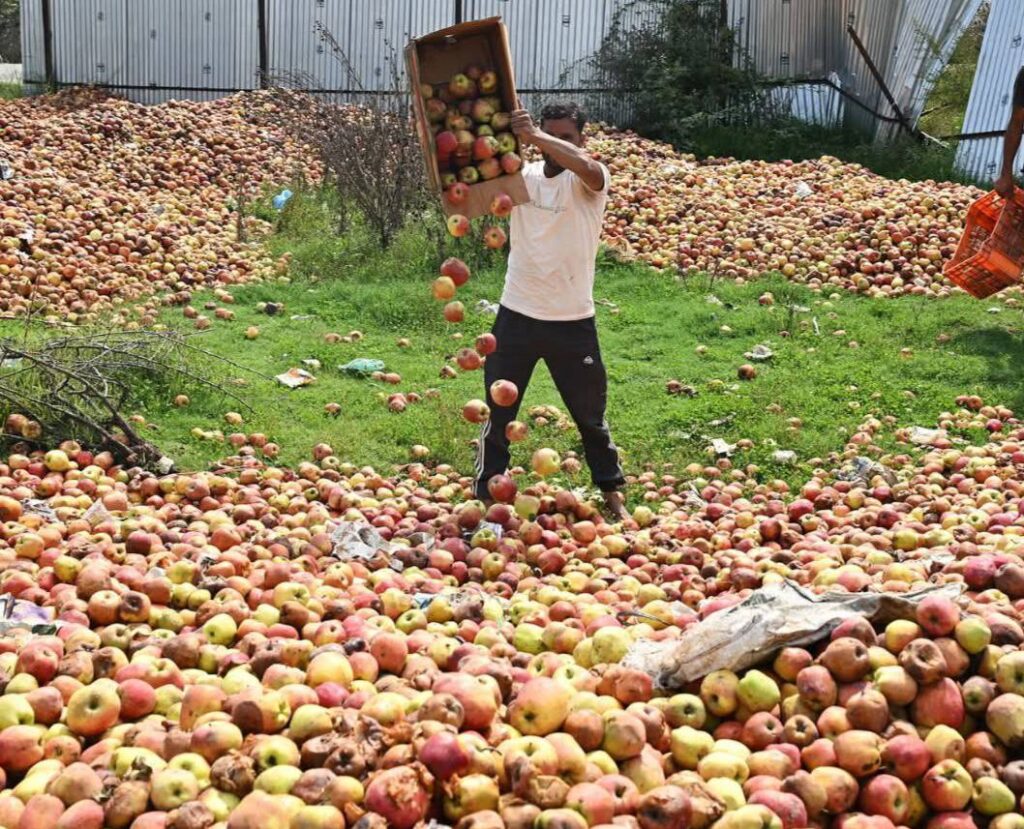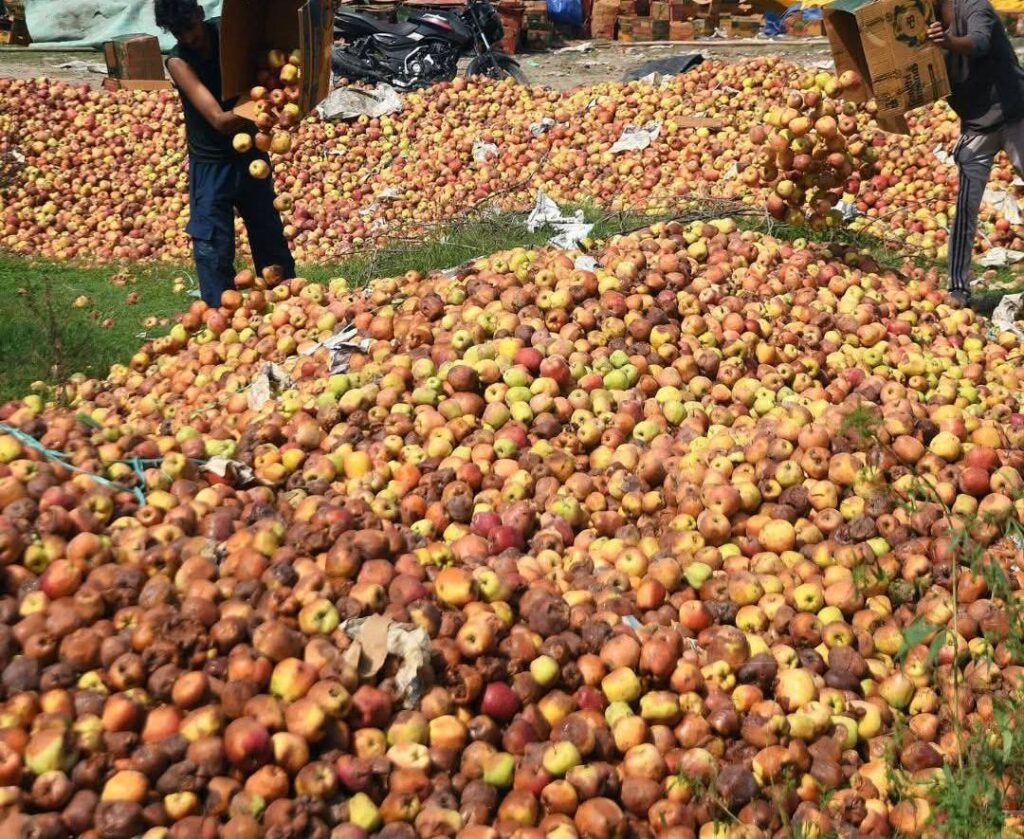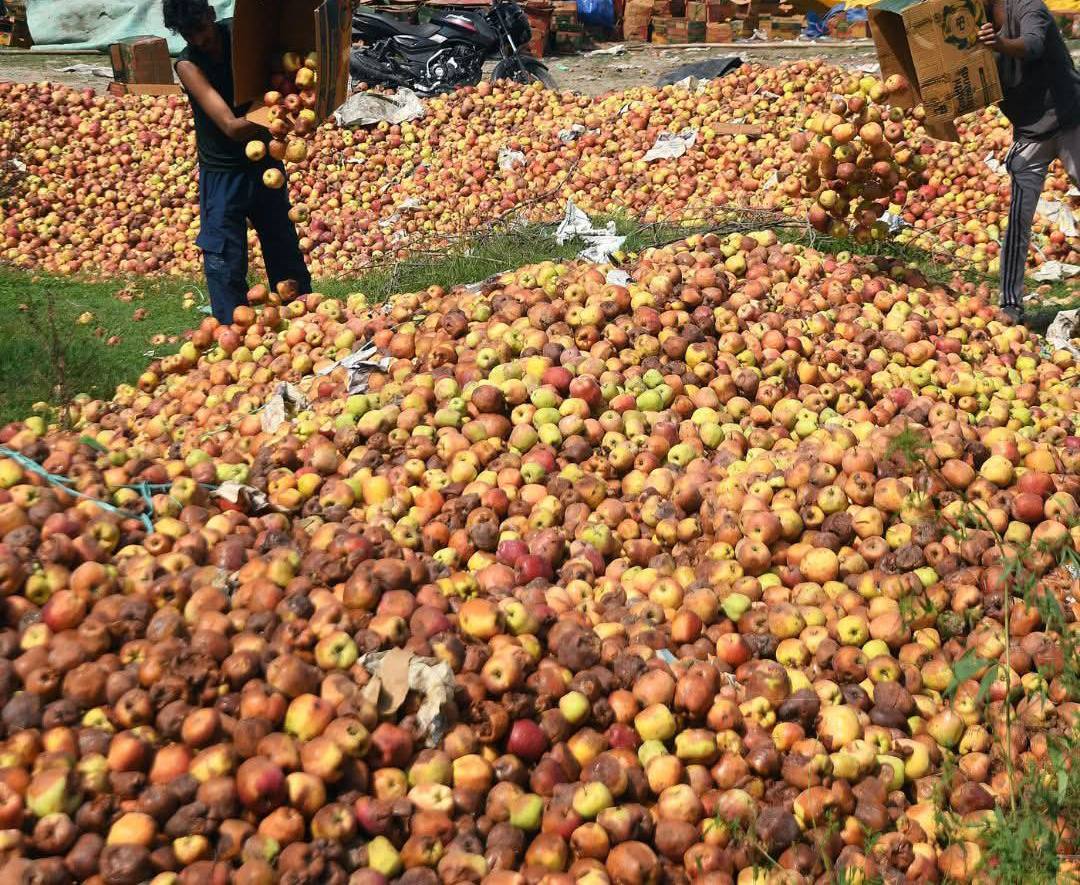By Ajaz Rashid
Every September, the orchards of Kashmir burst into their most important season. Red Delicious and Gala apples hang heavy on the branches, ready to be plucked, packed, and shipped to markets across India. For lakhs of families in the Valley, this is not just a harvest—it is the payoff for months of hard labor, pruning, spraying, and nurturing trees that have long been called the “backbone” of Kashmir’s economy.
This year, that backbone is cracking. With the Jammu–Srinagar National Highway, the Valley’s only surface lifeline to the outside world, closed for weeks due to landslides and shooting stones, Kashmir’s apple industry has been pushed into a crisis that farmers say could be catastrophic.
The Kashmir Valley Fruit Growers and Dealers Union has estimated losses of nearly Rs 700 crore this season alone. “Thousands of trucks carrying apples are stranded for days together. Each passing hour means more fruit rotting, more money lost, and more families pushed into distress,” said Bashir Ahmad Basheer, president of the Union.
Apples on the Road to Nowhere
At Parimpora mandi in Srinagar, the largest fruit market in the Valley, the losses are visible in heaps of decaying apples dumped in corners, turning the market into what traders call a “graveyard of fruit.” Farmers, who once celebrated the sight of trucks loaded with their produce, are now paying labourers to dispose of their rotten stock.
“We hired trucks and sent them with hope,” said Ghulam Nabi, a farmer from Pulwama. “But after being stuck on the highway for days, the fruit returned rotten. Now we spend even more to throw it away.”
“This is the first time I have seen growers paying for the destruction of their own produce,” added Mohammad Yousuf, a Sopore-based trader. “It is unprecedented.”

September marks the peak harvest of apple varieties such as Gala and Red Delicious. With nearly 90 percent of Gala apples already harvested, the closure could not have come at a worse time.
Mughal Road and Railways
Growers have long demanded that the government prepare alternatives to the vulnerable highway. While the Mughal Road has been partially opened, restrictions allowing only six-tyre vehicles have made it ineffective for long-distance trade. Trucks that manage to ply charge exorbitant rates.
“Earlier we paid Rs 50 to Rs 60 per apple box for transport via the highway. Now, through the Mughal Road, it costs Rs 200 per box,” said Abdul Majid, an orchardist from Shopian. “Our margins are already low. This makes farming unsustainable.”
Even railway services, which growers hoped would provide relief, have failed to step in effectively. “Rail connectivity exists, but no serious effort has been made to use it for fruit transport. Our apples could reach markets fresh if cargo trains were arranged,” said Mohammad Amin, a grower from Shopian.
Stranded Truckers
The crisis is not confined to growers alone. Truck drivers carrying apples, pears, and vegetables have been trapped on the highway for weeks, living in their vehicles, battling hunger, thirst, and uncertainty.
“These 13 days feel like 13 years,” said Bashir Ahmad, a driver from Anantnag. “We are sleeping in our trucks, surviving on biscuits and tea, and watching our goods rot.”
Drivers say the lack of basic facilities—drinking water, food stalls, toilets—has made life miserable. “We pool money to buy meals, but prices are high and supplies scarce,” said Irfan Malik, a driver transporting vegetables from Jammu.
Safety is another concern. “We are stuck in isolated areas for days. There is fear of theft and accidents. And no clear word from the authorities about when we will move,” Irfan added.
Humanity Amid Crisis
Amid the despair, small acts of kindness have become lifelines. In Qazigund, 23-year-old student Mohammad Aasim Ganie has turned his tractor into a makeshift water tanker, supplying free drinking water to stranded truckers.
“I am doing this only for the sake of Allah. Our religion teaches us to help one another,” Aasim said. He fills and distributes two to three tankers a day, each carrying 3,000 litres.
His efforts have earned the admiration of the drivers. “This brother is giving us water, and we will never forget it. Locals here have always helped us, but this young man’s service is rare humanity,” said a trucker.
Ripple Effect on the Economy
The apple sector directly sustains nearly three million people in Kashmir. From orchardists and traders to labourers, packers, and truckers, it is a vast chain whose survival depends on seamless transport.
“This is not just about fruit,” said Mohammad Ramzan, an orchardist from Pulwama. “If the apple economy collapses, the whole Valley will feel the shock. From small shopkeepers to banks, everyone depends on it.”

Already, traders say the market strategies have been disrupted. With freight rates soaring, growers are sending only second-grade produce of varieties like Kulu and Delicious, while holding back premium apples out of fear of loss. “The money we get in markets isn’t even covering freight. Our best fruit risks rotting in cold stores,” said Bashir Ahmad, a grower from Pulwama.
The sector, already hit by climate change, untimely rains, and competition from cheaper imports, now faces what many fear could be a crippling blow.
A Call for Urgent Action
Fruit growers’ associations have urged the government to treat the highway crisis as an economic emergency. They want the road restored on a war footing, the Mughal Road fully opened to all truck types, and railway cargo facilities made available immediately.
“Apple is the backbone of our economy. If the government fails to safeguard it, the repercussions will be disastrous—not just for growers but for the entire Valley,” Basheer warned.
The Jammu–Srinagar National Highway has long been a lifeline vulnerable to disruption. Each closure, caused by landslides or traffic mismanagement, brings with it fresh economic setbacks. But this year, with losses already crossing hundreds of crores and fruit literally turning into waste, the crisis feels sharper, deeper, and more urgent than ever before.
For now, Kashmir’s orchards stand laden with fruit, but their farmers carry only anxiety. Apples that should have been celebrated in markets from Delhi to Bangalore are instead rotting in trucks, mandis, and dumps. In the Valley, a single road’s closure has once again exposed how fragile the region’s economic lifeline really is.
